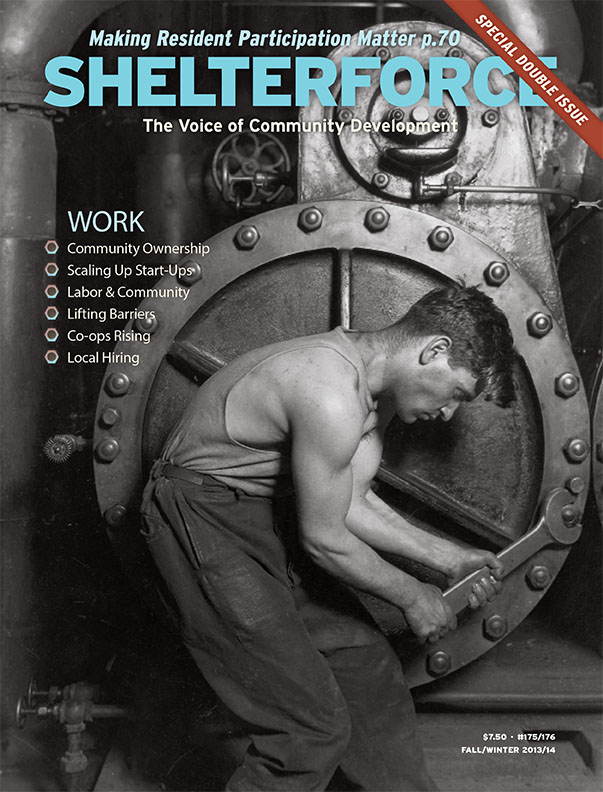Fall/Winter 2013-2014
Issue #175-176
The Work Issue
Rising income inequality and poverty levels make the goals of stabilizing distressed neighborhoods, increasing equal opportunity, and making a healthy home and neighborhood accessible to all many, many times harder. But despite the challenges, there are practitioners who have been supporting economic development in communities in need all along, whether it’s the community development financial institution field financing small businesses, community land trusts developing commercial space, or CDCs focusing on who builds their housing as well as who lives in it.

Power to the Members
Community development and planning organizations with a voting membership are rare, but the ones that do prioritize a democratic structure say it’s well worth the additional work.
Coming to Consensus
When and how can consensus decision making work for community-based organizations?
On Board
How do you make a community development organization’s board welcoming to residents and low-income members, and ensure that once there, they are more than window dressing?
Residents Need to Own Community Change
To get beyond superficial input, involve residents in a development from start to finish, from planning to implementation to ownership.
Interview With Tom Szaky, Founder, Terracycle
We spoke with Tom Szaky, TerraCycle’s founder and CEO, about social enterprise, locating in a distressed community, and what he as an employer would want out of workforce development programs.
Manufactured Locally
While there is much debate about the state of large-scale domestic manufacturing, a few places are quietly supporting local manufacturing for items that have been made overseas for some time, from jewelry to jeans.
Are You Subsidizing Big Business?
Massive corporations, not start-ups or local job creators, get the lion’s share of state and local development incentives.
Let’s Talk About Jobs—And Ownership
Community economic development is not just a matter of helping some households to get jobs and pay their bills. Done thoughtfully, it’s about . . .
Let’s Talk About Jobs—And Ownership
In theory, the recession has been over since 2009. But that theory means little for most workers in this country, who have only seen only 5 percent of economic growth […]
Put Your Spending Where Your Goals Are
Local procurement policies take money already being spent and direct it to local businesses to get more economic development benefit for the buck.
We Should Be Working Less
Changing our assumptions about what constitutes “normal” full time work could help address all sorts of social problems, from unemployment to civic disengagement.
An Organizer’s Work Is Never Done
An unprecedented local hiring win is a stepping stone in a trajectory to turn workforce development on its head.
Building Bridges, Building Muscle, Building Momentum
Two cities show how community-based organizations and labor can overcome their historical divide to work together.
Hitting Construction Hiring Goals
How do you ensure that the jobs a new development is supposed to bring to a community actually go to underrepresented populations?
Lifting the Fog on Section 3
When it’s more appealing to circumvent the law requiring that jobs in public housing construction go to qualified residents than to follow it, something needs to change.
Keeping the Jobs in House
Humboldt Construction Company, a subsidiary of a Chicago CDC, has been providing local employment for over 30 years. But it hasn’t been easy.
Focus on Scale Up, Not Start-up
To truly transform local neighborhoods, we must shift our attention to invest in enterprise scale, not start-ups, as a long-lasting solution for creating good jobs.
Getting Rid of the Middleman
A Brooklyn organization discovers that helping its constituents form worker cooperatives tackles poverty and social isolation in a way traditional job readiness training can’t.
To Build a Community Economy, Start With Solidarity
How residents who can’t afford to buy in can still get the benefits of co-op work and housing.
The Cooperative Solution
Cooperatives align closely with the goals and values of community developers and deserve more attention as an economic development strategy.
Thinking Outside the Big Box
Urban centers need to come up with creative solutions
to keep their local economies safe from the crushing
force of big-box retailers.
Forging a Transformative Vision
Building economic power through community ownership is the antidote to the systemic failures of our current system.
Q: Is a Land Bank the Same as a Land Trust?
A: Nope. They are totally different, though complementary tools. This chart will walk you through the differences.
Winning a Land Bank We Can Trust
Lessons from Philadelphia’s Campaign to Take Back Vacant Land
Placemaking for, and by, Whom?
Place-Making in Legacy Cities: Opportunities and Good Practices, prepared by New Solution Group LLC in partnership with Center for Community Progress, December 2013.
